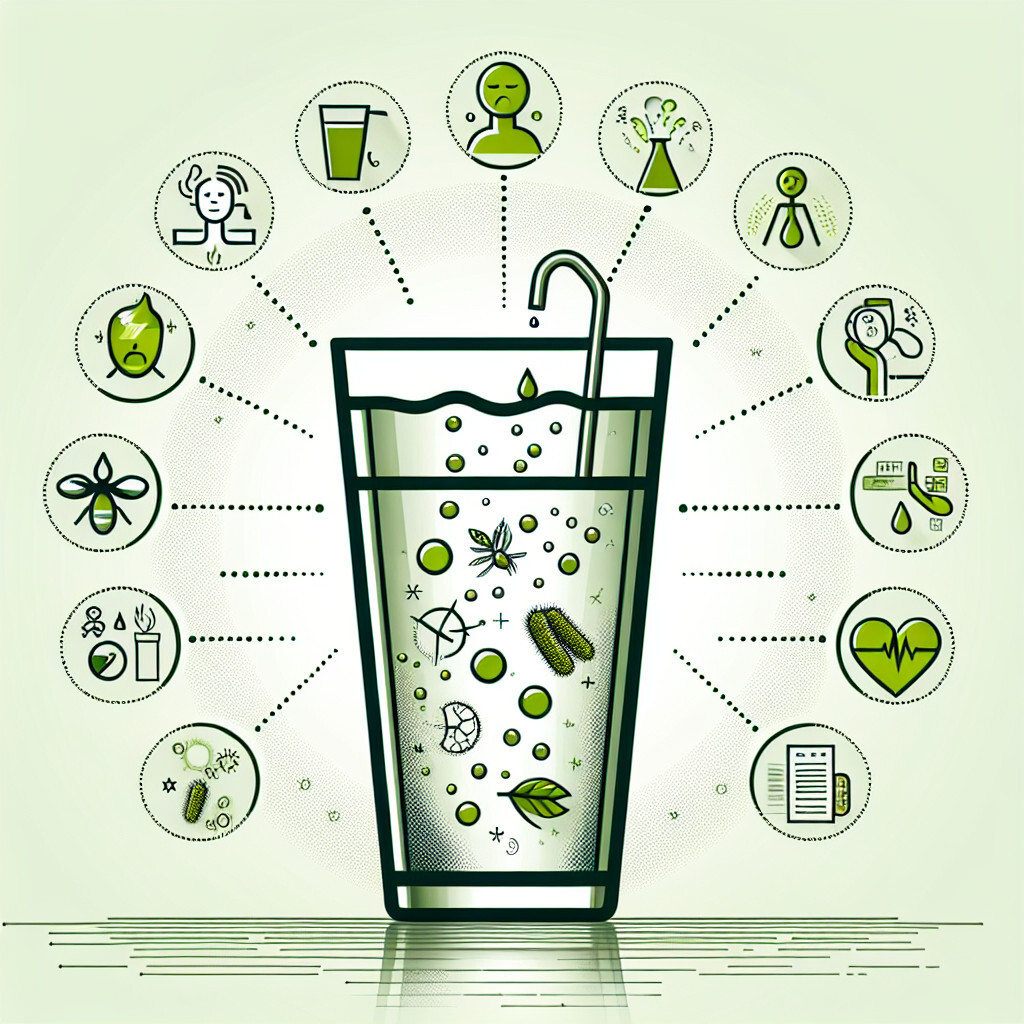-
Table of Contents
“Neem Water: Natural Wellness with a Side of Caution.”
Introduction

Drinking neem water, a herbal concoction made from the leaves of the neem tree, is often touted for its medicinal properties, including its antibacterial, anti-inflammatory, and antiviral effects. However, despite these potential benefits, it can also lead to several side effects. These may include kidney and liver damage due to its high concentration of bioactive compounds, allergic reactions in some individuals, and potential toxicity when consumed in large amounts. It can also negatively impact fertility and pregnancy, and may interact with certain medications. Therefore, while neem water can be beneficial, it is important to be aware of these potential side effects and use it responsibly.
Understanding the Potential Side Effects of Drinking Neem Water
Neem, a tree native to India, has been hailed for its medicinal properties for centuries. Its leaves, bark, and seeds are used in various forms of traditional medicine, and it is often consumed as a tea or in water. However, like any natural remedy, drinking neem water is not without potential side effects. Understanding these potential side effects is crucial for anyone considering incorporating neem water into their health regimen.
Neem water is typically made by boiling neem leaves in water, then straining the mixture and allowing it to cool. It is often consumed for its purported benefits, which include boosting immunity, treating skin conditions, and improving gastrointestinal health. However, despite these potential benefits, drinking neem water can also lead to several side effects.
One of the most common side effects of drinking neem water is an allergic reaction. Some individuals may experience skin irritation, itching, or rash after consuming neem water. In more severe cases, individuals may experience difficulty breathing, dizziness, or a rapid heart rate. If you experience any of these symptoms after drinking neem water, it is crucial to seek medical attention immediately.
In addition to allergic reactions, drinking neem water can also lead to other gastrointestinal issues. Some individuals may experience nausea, vomiting, or diarrhea after consuming neem water. These symptoms are typically mild and subside on their own, but if they persist, it may be necessary to seek medical attention.
Furthermore, neem water can also have a negative impact on fertility. Studies have shown that neem oil, which is often present in neem water, can act as a spermicide. This means that it can potentially reduce fertility in both men and women. While this effect may be beneficial for those seeking natural forms of contraception, it can be a significant drawback for those trying to conceive.
Another potential side effect of drinking neem water is its impact on blood sugar levels. Neem has been shown to lower blood sugar levels, which can be beneficial for individuals with diabetes. However, for those without diabetes, this effect can lead to hypoglycemia, a condition characterized by abnormally low blood sugar levels. Symptoms of hypoglycemia include fatigue, dizziness, and fainting.
Lastly, it’s important to note that neem water can interact with certain medications. For instance, it can enhance the effects of diabetes medications, leading to dangerously low blood sugar levels. It can also interact with medications that affect the immune system, potentially leading to an overactive immune response.
In conclusion, while drinking neem water can offer several potential health benefits, it is not without potential side effects. These can range from mild gastrointestinal issues to more serious concerns like allergic reactions and fertility issues. Therefore, it is crucial to consult with a healthcare provider before incorporating neem water into your health regimen. This is particularly important for individuals with pre-existing health conditions or those taking medication. By understanding the potential side effects of drinking neem water, individuals can make informed decisions about their health and wellbeing.
The Unintended Consequences of Consuming Neem Water Regularly
Neem, a tree native to India, has been hailed for centuries for its medicinal properties. Its leaves, bark, and seeds are used in various forms to treat a myriad of health issues. One such use is neem water, a concoction made by boiling neem leaves in water. While the benefits of drinking neem water are widely touted, it is equally important to be aware of its potential side effects. Consuming neem water regularly can lead to several unintended consequences, which we will explore in this article.
Neem water is known for its bitter taste, which is a testament to its potent bioactive compounds. These compounds, while beneficial in many ways, can also lead to gastrointestinal issues. Regular consumption of neem water can cause stomach upset, diarrhea, and nausea. This is particularly true for those with a sensitive digestive system. Therefore, it is advisable to start with small quantities and observe how your body reacts before making it a regular part of your diet.
Another potential side effect of drinking neem water is its impact on fertility. Studies have shown that neem can act as a natural contraceptive. Both men and women who are trying to conceive may want to avoid regular consumption of neem water. In animal studies, neem oil has been shown to cause reversible infertility in male rats, while in women, it can potentially interfere with the ovulation process. However, more research is needed to fully understand the extent of these effects in humans.
Neem water is also known to have hypoglycemic effects, meaning it can lower blood sugar levels. While this can be beneficial for people with high blood sugar, it can be a concern for those with hypoglycemia or those taking diabetes medications. Regular consumption of neem water can potentially lead to excessively low blood sugar levels, causing symptoms like dizziness, hunger, confusion, and even loss of consciousness. Therefore, individuals with diabetes or hypoglycemia should consult their healthcare provider before incorporating neem water into their routine.
Furthermore, neem water can have a negative impact on kidney and liver function if consumed in excess. The bioactive compounds in neem can put extra strain on these organs, leading to potential damage over time. This is especially concerning for individuals with pre-existing liver or kidney conditions. It is crucial to consume neem water in moderation and under the guidance of a healthcare professional to avoid these risks.
Lastly, allergic reactions to neem are not uncommon. Symptoms can range from skin rashes and itching to difficulty breathing in severe cases. If you experience any allergic symptoms after consuming neem water, it is important to seek immediate medical attention.
In conclusion, while neem water has numerous health benefits, its regular consumption can lead to several unintended side effects. These include gastrointestinal issues, potential fertility problems, hypoglycemic effects, strain on the liver and kidneys, and allergic reactions. It is always advisable to consult with a healthcare provider before incorporating any new supplement or dietary change into your routine. Remember, moderation is key, and what works well for one person may not necessarily be suitable for another.
Exploring the Negative Impacts of Neem Water on Digestive Health
Neem, a tree native to India, has been hailed for its medicinal properties for centuries. Its leaves, bark, and seeds are used in various forms of traditional medicine, and neem water, made by boiling neem leaves in water, is often recommended as a health tonic. However, while neem water does have several health benefits, it is not without its side effects, particularly when it comes to digestive health.
Neem water is known for its bitter taste, which is a result of the numerous bioactive compounds it contains. These compounds, while beneficial in many ways, can have a negative impact on the digestive system when consumed in excess. One of the most common side effects of drinking neem water is an upset stomach. This is because the bioactive compounds in neem can irritate the stomach lining, leading to discomfort, nausea, and in some cases, vomiting.
Moreover, neem water can also cause diarrhea. The compounds in neem stimulate the intestines, speeding up bowel movements and leading to loose, watery stools. While this can be beneficial for those suffering from constipation, it can be problematic for others. Persistent diarrhea can lead to dehydration and electrolyte imbalance, which can have serious health consequences if not addressed promptly.
Another potential side effect of drinking neem water is a decrease in appetite. The bitter taste of neem water can make food seem less appealing, leading to a reduced desire to eat. Over time, this can result in weight loss and nutritional deficiencies. It’s important to note that while weight loss might be desirable for some, it should be achieved through a balanced diet and regular exercise, not through appetite suppression.
In addition to these side effects, drinking neem water can also interfere with certain medications. Neem has been found to interact with drugs that are metabolized by the liver, potentially altering their effectiveness. This includes many common medications, such as paracetamol, ibuprofen, and certain types of antibiotics. Therefore, if you’re taking any medication, it’s important to consult with a healthcare professional before incorporating neem water into your routine.
Lastly, it’s worth noting that while neem water is generally safe for most adults when consumed in moderation, it should be avoided by certain groups. Pregnant and breastfeeding women, for instance, should not drink neem water, as the compounds in neem can potentially harm the fetus or nursing infant. Similarly, people with autoimmune diseases should avoid neem, as it can stimulate the immune system and potentially exacerbate symptoms.
In conclusion, while neem water does have several health benefits, it’s not without its drawbacks. The bioactive compounds in neem can cause a range of digestive issues, from upset stomach and diarrhea to decreased appetite. Furthermore, neem can interact with certain medications and should be avoided by certain groups. Therefore, while neem water can be a beneficial addition to your health regimen, it’s important to consume it in moderation and under the guidance of a healthcare professional.
Neem Water Consumption: A Deep Dive into its Possible Side Effects
Neem, a tree native to India, is renowned for its medicinal properties and has been used in traditional Ayurvedic medicine for centuries. The leaves, bark, and seeds of the neem tree are used to treat a variety of ailments, and neem water, made by boiling neem leaves in water, is a popular home remedy for skin and hair problems. However, like any other medicinal substance, neem water also has potential side effects that should not be overlooked.
One of the most common side effects of drinking neem water is an allergic reaction. Some people may experience skin rashes, itching, or breathing difficulties after consuming neem water. These reactions are typically due to an allergic response to the compounds found in neem. Therefore, it is advisable to start with a small amount of neem water to test for any allergic reactions before incorporating it into your regular diet.
Another potential side effect of neem water is its impact on fertility. Studies have shown that neem can act as a natural contraceptive, reducing fertility in both men and women. While this property of neem can be beneficial for those seeking natural methods of birth control, it can be a concern for those trying to conceive. Therefore, if you are planning to start a family, it would be wise to consult with a healthcare professional before consuming neem water regularly.
Neem water can also have a negative impact on your liver and kidney function if consumed in excess. Neem contains bioactive compounds that can potentially cause liver and kidney damage when consumed in large quantities over a prolonged period. Therefore, moderation is key when consuming neem water. It is also crucial to monitor your body’s response and seek medical advice if you notice any unusual symptoms.
Furthermore, neem water can interact with certain medications, altering their effectiveness. For instance, it can enhance the effects of diabetes medication, leading to excessively low blood sugar levels. It can also interfere with the effectiveness of immunosuppressant drugs. Therefore, if you are on any medication, it is essential to discuss with your healthcare provider before starting to consume neem water.
Lastly, neem water can cause gastrointestinal issues in some people. Consuming neem water on an empty stomach can lead to nausea, vomiting, and diarrhea. This is because neem has potent antibacterial properties that can disrupt the balance of gut bacteria, leading to digestive issues. To avoid this, it is recommended to consume neem water with meals.
In conclusion, while neem water has numerous health benefits, it is not devoid of potential side effects. Allergic reactions, fertility issues, liver and kidney damage, drug interactions, and gastrointestinal problems are some of the possible side effects of drinking neem water. Therefore, it is crucial to consume neem water in moderation and under the guidance of a healthcare professional. Remember, what works for one person may not work for another, and what is beneficial in small amounts can be harmful in excess. Therefore, it is always best to listen to your body and seek professional advice when incorporating new substances into your diet.
Q&A
1. Question: What are the potential side effects of drinking neem water?
Answer: Potential side effects of drinking neem water include kidney and liver damage, diarrhea, vomiting, fatigue, and metabolic acidosis.
2. Question: Can drinking neem water cause allergic reactions?
Answer: Yes, some people may experience allergic reactions such as skin rash, itching, or difficulty breathing after drinking neem water.
3. Question: Is neem water safe for pregnant or breastfeeding women?
Answer: Neem water is not recommended for pregnant or breastfeeding women as it can potentially cause a miscarriage or harm the infant.
4. Question: Can neem water interact with other medications?
Answer: Yes, neem water can interact with other medications, particularly those metabolized by the liver. It can enhance or decrease the effects of these drugs, leading to potential health risks.
Conclusion
Drinking neem water can have several side effects including diarrhea, vomiting, fatigue, drowsiness, seizures, loss of appetite, and in severe cases, it can lead to liver damage. It is also not recommended for pregnant or breastfeeding women as it can potentially cause a miscarriage. Therefore, while neem water has various health benefits, it should be consumed with caution due to these potential side effects.






